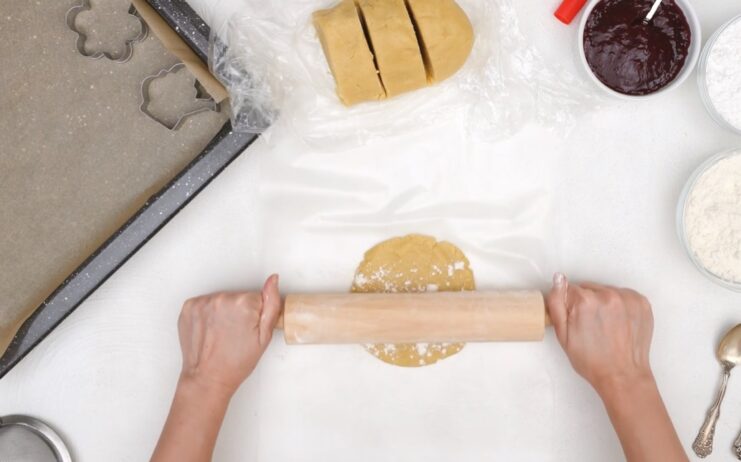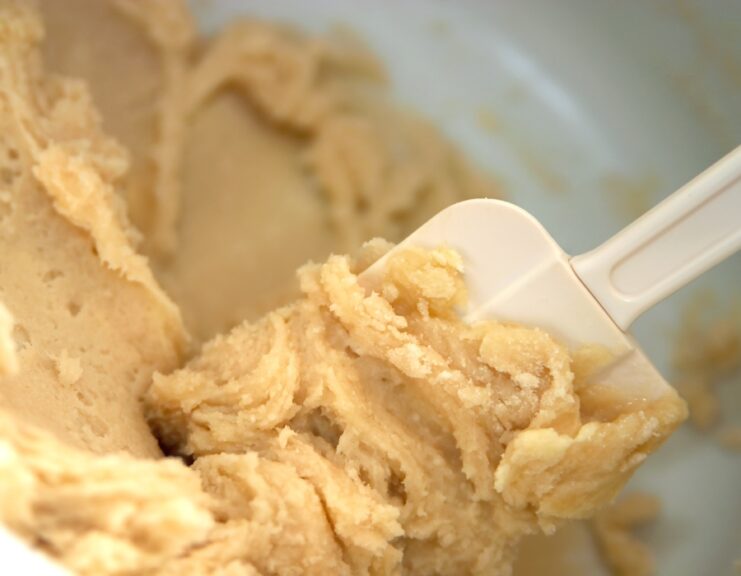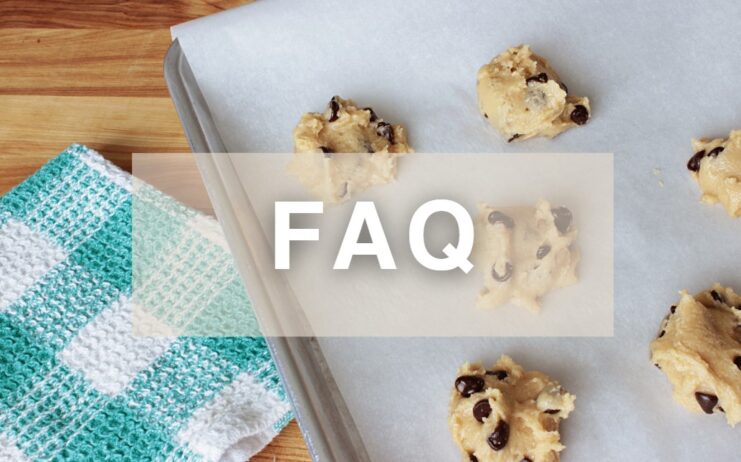Cookie dough is a delicious treat that is loved by many. Whether you’re using it to bake fresh cookies or eating it raw, it’s important to know how long it can last in the fridge to avoid any risk of foodborne illness. In this article, we’ll discuss the shelf life of cookie dough in the fridge, how to properly store it, and some tips on how to tell if it has gone bad. Whether you’re a baker or just enjoy indulging in some cookie dough, read on to learn everything you need to know about the lifespan of cookie dough in the fridge.
Freshly Made Cookie Dough

Making your own cookie dough from scratch can be a great way to bring freshness to your baking. It can also be a great way to minimize waste, as the dough can last for a few days in the fridge.
How long it can last in the fridge
Store-bought is designed to last quite a while in the refrigerator, as long as it is stored properly and kept away from any bacteria that could potentially spoil it. Homemade cookie dough, however, may not last as long. The shelf life for it depends on various factors, such as the ingredients used, how long it has been refrigerated and whether or not any raw ingredients, such as eggs or dairy products, were added to the mix.
If it has been refrigerated for less than two days—or contains raw egg or other dairy products—it’s best to eat it within that time frame for safety reasons. In general, though, if you keep it refrigerated properly in an airtight container, its shelf life can be extended to up to two weeks.
If you’d like your cookie dough mix to last even longer in the fridge (up to a few months), go ahead and freeze it! Just be sure to thaw completely before baking for the best results.
How to store it properly
Properly stored, freshly made can last for up to one week in the refrigerator. To store your dough properly, make sure it’s covered tightly and placed in an airtight container. After using it, clean out any pans or utensils that came in contact with the cookie dough to avoid cross-contamination.
It’s best not to add any ingredients that contain raw eggs such as extracts or chocolates until it is ready for baking because this could cause it to spoil quickly. Additionally, if you plan on freezing your cookie dough for future use, it’s important to remember that you need to properly wrap and seal it before storing it in an airtight container or freezer-safe bag. Letting it thaw before baking is also essential because this allows ingredients like butter to soften evenly – giving you better results when baking!
Pre-Made Cookie Dough

Pre-made cookie dough is a great way to have a ready-baked treat with minimal effort. But how long can you keep it in the fridge? Understanding the shelf-life of cookie dough can help you make sure it’s still safe to eat when you’re ready to bake.
How long it can last in the fridge
It generally lasts for 1-2 weeks when stored in a refrigerator. The shelf-life of pre-made cookie dough can be increased if stored correctly, but it is important to remember that it can spoil easily due to its ingredients and must be eaten within a few days.
Before using, always check the “best by” or expiration date printed on the cookie dough package. If you are not sure if it is good, smell it and feel it. If there are any signs of spoilage such as an off smell or discoloration, do not consume it.
When storing it in a refrigerator, make sure that it is completely sealed in an airtight container to prevent contamination from other foods and that it is placed away from other food items which may cause cross-contamination. Additionally, make sure to read safety tips on how to handle cooked vs raw eggs as well as how to achieve pasteurization when necessary.
How to store it properly
Proper storage of it is essential to ensure that the product remains safe and satisfies your taste buds! In general, it should be stored in an airtight container, such as a plastic food storage bag or another suitable container. It should not be exposed directly to air. When put in the fridge, it should be placed at the back as this is usually the coolest spot with less temperature fluctuations.
It’s best to avoid storing pre-made cookie dough in the freezer since this can cause it to dry out and lose its flavor. However, if stored properly, pre-made cookie dough can last up to two weeks in the fridge before it begins to spoil and become unsafe for consumption. To ensure safety, the pre-made cookie dough should be consumed within this time frame and any leftovers either be discarded or frozen for future use.
Baked Cookies

Cookies are a favorite among many and are a great way to show someone you care. But what about baking the cookie dough? Is it safe to store the cookie dough for a long time in the refrigerator?
Let’s explore the benefits of baking cookies as opposed to storing the dough in the fridge. We will discuss the differences between baking them immediately and storing the dough in the fridge for a prolonged period.
How long they can last in the fridge
The length of time that cookie dough can last in the fridge depends on a few factors, including the type of cookies you plan on making and how long they will take to bake. Some recipes are best when consumed fresh, while others benefit from being allowed to rest and further develop flavor. Below is an overview of acceptable storage times for cookie dough in the refrigerator:
Short-term Storage: Most of them can be stored in the refrigerator for up to 2 weeks. This includes ones with eggs, butter-based products, and no-bake varieties. The cold temperatures of the refrigerator help keep these ingredients set, protecting them from harmful bacteria growth.
Longer-Term Storage: Ones that do not contain eggs can generally be stored in an airtight container or bag for up to 3 months if frozen. Freeze them after they have formed into Balls. These will last significantly longer than a single piece of rolled-out or scooped-out cookie dough as any exposed surface area is more susceptible to spoilage even when frozen. To bake frozen cookies, allow them to thaw slightly before baking—this helps ensure they get baked evenly through!
How to store them properly
Properly storing it is important to ensure that it remains safe and edible. For immediate baking, cookie dough should be stored in the refrigerator until you’re ready to use it. This stops any further fermentation or rising of the dough, which would affect its flavor and texture.
Short-term storage (1 week): Once you split it into batches, wrap each tightly in plastic wrap and store it in an airtight container or resealable plastic bag in the refrigerator for up to one week. Check for signs of spoilage before baking — if there are any unpleasant odors or colors, discard them immediately.
Long-term storage (3 months): To extend your long-term storage period for 3 months past 1 week, wrap individual pre-portioned cookie dough balls tightly in plastic wrap. Place them inside a resealable plastic bag before transferring them to your freezer — this will act as an extra layer of protection from odors or freezer burn. Let them defrost overnight in the refrigerator before baking for best results.
Other Considerations

While they can generally last for about three days in the fridge, there are a few other considerations to keep in mind. For example, whether the cookie dough has been mixed with egg or other wet ingredients, how the dough is stored, and the temperature of the fridge all affect how long the cookie dough will remain good.
How to tell if cookie dough has gone bad
In general, it should last up to five days in the fridge. However, there are certain signs you can look for to tell if it is starting to spoil or has gone bad. If your cookie dough smells off or looks different than how it did when you put it in the fridge, chances are it has expired. It is best to discard the dough and make a new batch.
Additionally, if you have been storing the cookie dough for more than five days, examine it for any mold growth before consuming it. Most importantly, never eat raw cookie dough without cooking it first as this can lead to serious illness from food-borne bacteria such as salmonella and E-coli when consuming raw eggs or uncooked flour.
Additionally, baking with refrigerated cookie dough should be done within a few days after preparation. If the texture of it isn’t similar to what it was when freshly made and chilled, it’s best not to use it anymore since warm temperatures can cause bacteria growth in food items like these.

How to extend the shelf life of cookie dough
Cookie dough stored in the refrigerator can last up to six weeks with proper storage and handling. However, it is important to note that this assumes that the dough is refrigerated within two hours of mixing, or within two hours after bringing it home from the store. To extend the shelf life, you should use airtight containers or freezer-safe containers for storage.
When storing it, always make sure that it is cooled to refrigerator temperature before putting it in an airtight container or wrapping it tightly in plastic wrap. If you are freezing your cookie dough, make sure that it has been thoroughly frozen through before wrapping so as to reduce condensation when thawing. When freezing multiple batches of cookie dough at once, be sure to label each one with a date so you know how long each one can safely stay frozen without going bad.
For longer-term storage like freezing for up to three months, you will want to double-wrap it using layers of parchment/wax paper and plastic wrap before placing it into a freezer bag for ultimate air-trapping protection. Make sure no air can get in!
Finally, always bring your cookie dough out of the refrigerator at least 15 minutes prior to baking so it will reach its desired consistency when baked – warm enough to spread over your baking surface without being too soft and messy!
FAQs

Q: Can I eat cookie dough that has been in the fridge for longer than 5 days?
A: It is not recommended to eat cookie dough that has been in the fridge for longer than 5 days as it may become unsafe to eat. It is best to err on the side of caution and discard any leftover cookie dough that has been in the fridge for too long.
Q: What are some signs that cookie dough has gone bad?
A: If the cookie dough has an off smell, a strange color, or has developed mold, it should not be eaten. Additionally, if the cookie dough has been in the fridge for an extended period of time, it may develop a sour or off taste.
Q: Can I still bake cookies with cookie dough that has been in the fridge for 5 days?

A: It is generally safe to bake cookies with cookie dough that has been in the fridge for 5 days, as long as there are no signs of spoilage. However, the texture and taste of the cookies may not be as good as they would be with fresh cookie dough.
Q: Can expired cookies make you sick?
A: It depends on how long they have been expired and the condition in which they have been stored. Generally, expired cookies won’t make you sick, but they may not taste as good as fresh ones. However, if the cookies have been stored improperly, such as being exposed to moisture or high heat, they could develop mold or bacteria that could make you sick if you eat them.
Q: Can eating expired cookies cause food poisoning?
A: Eating expired cookies that have been stored improperly could potentially cause food poisoning if they contain harmful bacteria. Symptoms of food poisoning can include nausea, vomiting, diarrhea, and stomach cramps. If you experience any of these symptoms after eating expired cookies, it’s important to seek medical attention.
Q: Is 2-year-old flour still good?
A: It depends on the type of flour and how it has been stored. All-purpose flour can last up to 2 years if stored properly in an airtight container in a cool, dry place. However, whole grain flours and nut flours have a shorter shelf life due to their higher oil content and should be used within 3 to 6 months. To ensure the flour is still good, check for signs of spoilage such as a rancid smell or mold.
Conclusion
In conclusion, they can last in the fridge for up to several days or even weeks, depending on the type of dough and how it is stored. It is important to follow proper food storage guidelines and to use your best judgment when deciding whether or not to consume leftover dough.
By being mindful of the storage time and conditions, you can enjoy fresh and delicious cookies whenever you want, without worrying about the safety or quality of the dough. So next time you’re planning to make cookies, make sure to store any leftovers properly to extend their shelf life and enjoy them for as long as possible.

